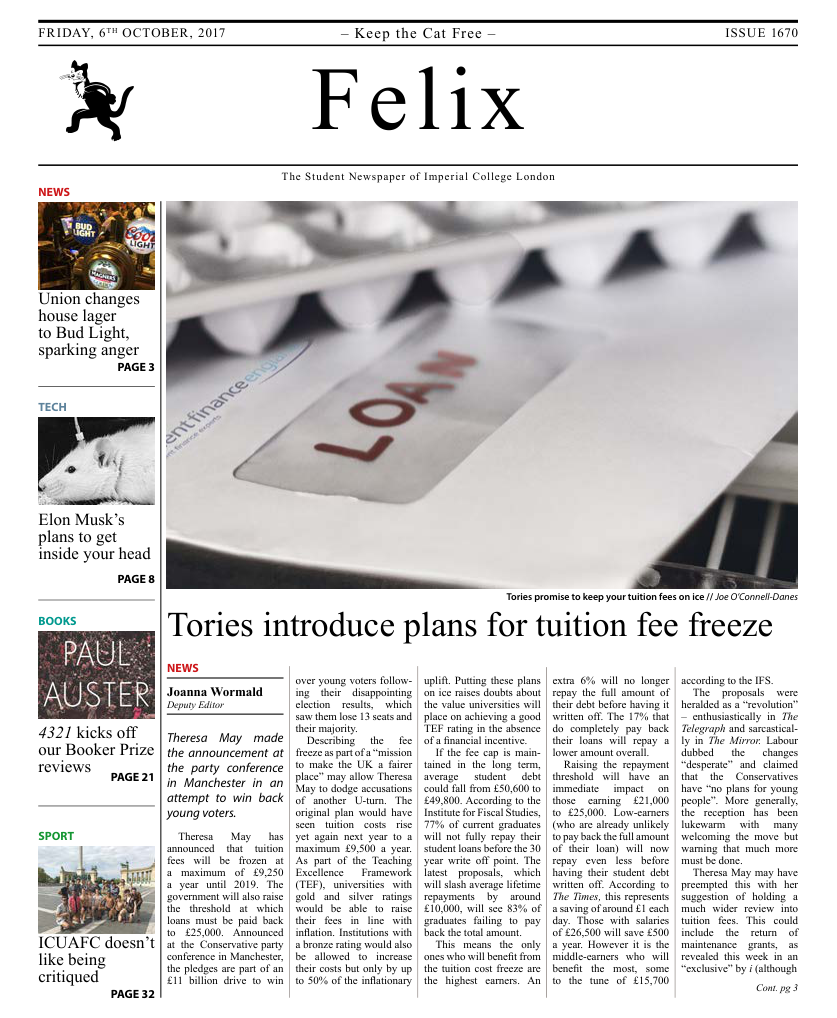Tories introduce plans for tuition fee freeze
Theresa May made the announcement at the party conference in Manchester in an attempt to win back young voters.

Theresa May has announced that tuition fees will be frozen at a maximum of £9,250 a year until 2019. The government will also raise the threshold at which loans must be paid back to £25,000. Announced at the Conservative party conference in Manchester, the pledges are part of an £11 billion drive to win over young voters following their disappointing election results, which saw them lose 13 seats and their majority.
Describing the fee freeze as part of a “mission to make the UK a fairer place” may allow Theresa May to dodge accusations of another U-turn. The original plan would have seen tuition costs rise yet again next year to a maximum £9,500 a year. As part of the Teaching Excellence Framework (TEF), universities with gold and silver ratings would be able to raise their fees in line with inflation. Institutions with a bronze rating would also be allowed to increase their costs but only by up to 50% of the inflationary uplift. Putting these plans on ice raises doubts about the value universities will place on achieving a good TEF rating in the absence of a financial incentive.
If the fee cap is maintained in the long term, average student debt could fall from £50,600 to £49,800. According to the Institute for Fiscal Studies, 77% of current graduates will not fully repay their student loans before the 30 year write off point. The latest proposals, which will slash average lifetime repayments by around £10,000, will see 83% of graduates failing to pay back the total amount.
This means the only ones who will benefit from the tuition cost freeze are the highest earners. An extra 6% will no longer repay the full amount of their debt before having it written off. The 17% that do completely pay back their loans will repay a lower amount overall.
Raising the repayment threshold will have an immediate impact on those earning £21,000 to £25,000. Low-earners (who are already unlikely to pay back the full amount of their loan) will now repay even less before having their student debt written off. According to The Times, this represents a saving of around £1 each day. Those with salaries of £26,500 will save £500 a year. However it is the middle-earners who will benefit the most, some to the tune of £15,700 according to the IFS.
The proposals were heralded as a “revolution” – enthusiastically in The Telegraph and sarcastically in The Mirror. Labour dubbed the changes “desperate” and claimed that the Conservatives have “no plans for young people”. More generally, the reception has been lukewarm with many welcoming the move but warning that much more must be done.
Theresa May may have preempted this with her suggestion of holding a much wider review into tuition fees. This could include the return of maintenance grants, as revealed this week in an “exclusive” by i (although also mentioned in The Guardian three days previously). An anonymous senior source told the i: “We don’t think it is right that the poorest students come out of university with most debt.”
Maintenance grants were scrapped in 2015 in favour of loans, which were more generous but also had to be paid back with interest. Then-chancellor George Osborne made the changes on the basis that maintenance grants cost the taxpayer £1.57 billion a year. He claimed that lifting the cap on student places would double this figure to £3 billion and there would be a “basic unfairness in asking taxpayers to fund grants for people who are likely to earn a lot more than them”.
The IFS estimates that switching from loans to grants would cost just under £500 million. The changes to tuition fees would also require an additional £2 billion government funding. The government has declined to say where this extra money will come from. Any details will emerge in Philip Hammond’s autumn budget statement next month. Let’s hope the magic money tree is still alive and well.










